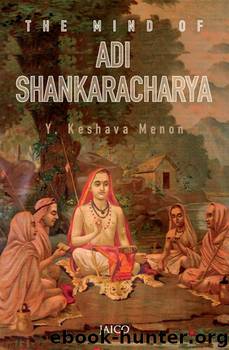The Mind of Adi Shankaracharya by Menon Y. Keshava

Author:Menon, Y. Keshava [Menon, Y. Keshava]
Language: eng
Format: epub
Publisher: Jaico Books
Published: 2007-12-31T16:00:00+00:00
Maya and Avidya
In the last chapter we said that the personal deity Ishvara has produced the material world from the pure impersonal Brahman by the power of maya. It is now time to look more closely at this concept of maya. We have seen that the association of maya with Brahman goes back to beginningless time; that its relation with Brahman is that of energy to energiser; that it has two powers — the power of creating, and the power of veiling and thus causing error, from which it has acquired the rather misleading name ‘illusion’. But what is maya?
It has to be said at the outset that maya defies our power of logical understanding and rational comprehension. It is neither real nor unreal: neither positive nor negative. It is inexplicable and indefinable. It is the illusion in the perception of silver where there is actually only a shell, and that deeper illusion by which an object seems to the commonsense mind to have inherent qualities, such as sweetness in sugar. Scientific investigation shows that such qualities are not inherent in the article itself, but are our own response to certain featureless events associated with the article. On the other hand, the fact that the events do not possess the qualities we ascribe to them does not mean that they do not exist. Both they and our appreciation of them, though not wholly real, do have a reality, a relative reality; indeed maya is the very stuff of creation, both the weaving and the curtain.
Maya is nearly, but not quite, synonymous with avidya. There is, a subtle and important distinction between the two concepts. When one is thinking of the concept in relation to the impersonal Brahman, the term ‘maya’ is used; but when it is applied to the divine spark within ourselves, the Atman, the term ‘avidya’ is used. In the works of Shankara’s followers there have been exceptions to this strict differentiation, but in strict-parlance the word ‘avidya’ is reserved for the empirical aspect of the world creative process as seen from the standpoint of the individual soul. In other words, ‘‘maya’ is used when the energy of the Lord is seen in its creative aspect, ‘avidya’ when we are thinking of its power of veiling; avidya is the cosmic force that in the nature of things veils true knowledge.
Avidya means, etymologically, the antithesis of knowledge — absence of knowledge, but here, it means far more than mere nescience, It is not a negative concept. All knowledge covering the phenomenal world are embraced by the term Avidya. According to Isa Upanishad, it is through Avidya that one crosses the ford of death, while through Vidya one attains to immortality. Both are of equal importance to the seeker.
First, what is the origin of avidya? It is manifestly an unsound metaphysical position to say that its origin is in Brahman, because Brahman is pure consciousness and absolute knowledge. (We considered this logical difficulty in the last chapter.) It cannot be traced to the individual soul, because individuality itself is a product of avidya.
Download
This site does not store any files on its server. We only index and link to content provided by other sites. Please contact the content providers to delete copyright contents if any and email us, we'll remove relevant links or contents immediately.
Fingersmith by Sarah Waters(2532)
Kundalini by Gopi Krishna(2180)
Wheels of Life by Anodea Judith(2144)
Indian Mythology by Devdutt Pattanaik(1936)
The Bhagavad Gita by Bibek Debroy(1929)
The Yoga of Jesus: Understanding the Hidden Teachings of the Gospels by Paramahansa Yogananda(1860)
Autobiography of a Yogi (Complete Edition) by Yogananda Paramahansa(1824)
The Man from the Egg by Sudha Murty(1812)
The Book of Secrets: 112 Meditations to Discover the Mystery Within by Osho(1673)
Chakra Mantra Magick by Kadmon Baal(1638)
The Sparsholt Affair by Alan Hollinghurst(1585)
Sparks of Divinity by B. K. S. Iyengar(1531)
Gandhi by Ramachandra Guha(1528)
Avatar of Night by Tal Brooke(1519)
Karma-Yoga and Bhakti-Yoga by Swami Vivekananda(1491)
The Bhagavad Gita (Classics of Indian Spirituality) by Eknath Easwaran(1487)
The Spiritual Teaching of Ramana Maharshi by Ramana Maharshi(1432)
Hindoo Holiday by J. R. Ackerley(1377)
Hinduism: A Very Short Introduction (Very Short Introductions) by Knott Kim(1374)
